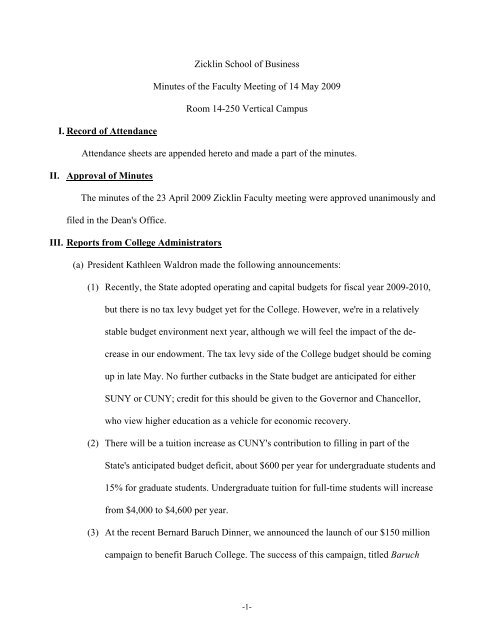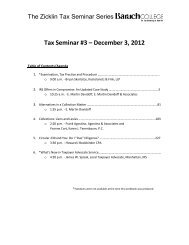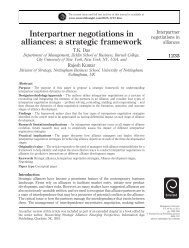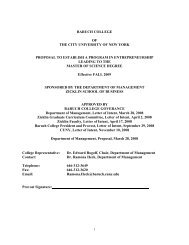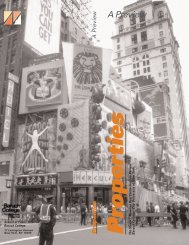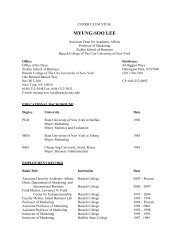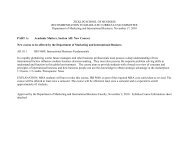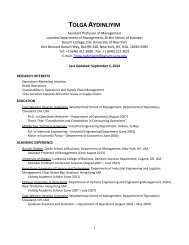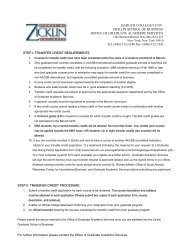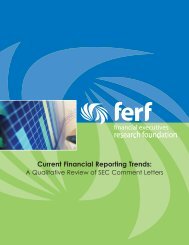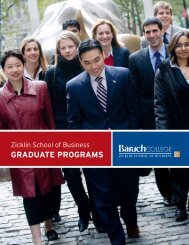decrease
May 14, 2009 - zicklin : school of business - CUNY
May 14, 2009 - zicklin : school of business - CUNY
- No tags were found...
You also want an ePaper? Increase the reach of your titles
YUMPU automatically turns print PDFs into web optimized ePapers that Google loves.
Zicklin School of Business<br />
Minutes of the Faculty Meeting of 14 May 2009<br />
Room 14-250 Vertical Campus<br />
I. Record of Attendance<br />
Attendance sheets are appended hereto and made a part of the minutes.<br />
II. Approval of Minutes<br />
The minutes of the 23 April 2009 Zicklin Faculty meeting were approved unanimously and<br />
filed in the Dean's Office.<br />
III. Reports from College Administrators<br />
(a) President Kathleen Waldron made the following announcements:<br />
(1) Recently, the State adopted operating and capital budgets for fiscal year 2009-2010,<br />
but there is no tax levy budget yet for the College. However, we're in a relatively<br />
stable budget environment next year, although we will feel the impact of the <strong>decrease</strong><br />
in our endowment. The tax levy side of the College budget should be coming<br />
up in late May. No further cutbacks in the State budget are anticipated for either<br />
SUNY or CUNY; credit for this should be given to the Governor and Chancellor,<br />
who view higher education as a vehicle for economic recovery.<br />
(2) There will be a tuition increase as CUNY's contribution to filling in part of the<br />
State's anticipated budget deficit, about $600 per year for undergraduate students and<br />
15% for graduate students. Undergraduate tuition for full-time students will increase<br />
from $4,000 to $4,600 per year.<br />
(3) At the recent Bernard Baruch Dinner, we announced the launch of our $150 million<br />
campaign to benefit Baruch College. The success of this campaign, titled Baruch<br />
-1-
Means Business: Reaching New Heights of Excellence, will make possible new levels<br />
of quality for our students, our faculty and our academic programs. So far, we've<br />
raised $95 million, mainly in pledges, not cash. The dinner honored Larry Zicklin<br />
and David Krell for their outstanding contributions to the College. The dinner itself<br />
raised $1 million, a remarkable achievement for a dinner in these difficult times.<br />
(4) The following individuals will receive Presidential Excellence Awards:<br />
(1) Distinguished Faculty Scholarship – Professor Alfonso Quiroz, Department<br />
of History<br />
(2) Distinguished Teaching – Professor Susan Locke, Department of Psychology;<br />
and Antonietta D'Amerlio, Department of Modern Languages and<br />
Comparative Literature<br />
(3) Distinguished Service – Dr. Angela Anselmo, Director of SEEK<br />
(5) At the Spring 2009 commencement, the College will grant honorary degrees to Sidney<br />
Harman and Milton Cooper, two distinguished alumni of the Zicklin School. Mr.<br />
Harman will give a keynote speech. Mayor Bloomberg will also speak at commencement.<br />
(6) As you know all too well, Blackboard has been functioning sporadically over the<br />
spring semester. All I can do is commiserate with you. I realize this has been difficult,<br />
and appreciate your commitment to our positive learning environment and your<br />
flexibility in adjusting to this inconvenience. We continue to coordinate with our<br />
colleagues at CUNY, who are working to resolve the issues.<br />
(7) I have received all of the recommendations for department chairs and have accepted<br />
them.<br />
-2-
(8) Professor Seth Lipner expressed concern about the draconian cuts in the travel<br />
budget and how it is undermining our commitment to scholarship and achieving professional<br />
visibility. President Waldron responded by concurring, and hopes to restore<br />
travel funding; the cutbacks were due in part to the decline in the College's endowment,<br />
which formerly financed $400 thousand of travel for Zicklin School personnel.<br />
She anticipates that the travel funding will come back; we've raised three $1 million<br />
gifts in the last month. She urges faculty to identify alumni who might be contemplating<br />
donations to the College and convey that information to College Advancement.<br />
President Waldron anticipates that travel will probably be heavily dependent<br />
on philanthropy in the future.<br />
(9) In response to a question from Professor Christopher Hessel, Dean Elliott noted that<br />
we can swap some money categories, i.e., from hiring to research and/or travel.<br />
However, some swapping has already occurred in response to the budget cutbacks;<br />
some vacancy savings were part of our budget cutbacks, but further faculty cutbacks<br />
might lead to fewer course offerings. Professor Waldron suggested that we should<br />
aim to increase revenue as well as <strong>decrease</strong> costs. We’re trying to increase revenue<br />
by increasing student fees, especially graduate student fees, to make our tuition and<br />
fee structure more rationale. For example, right now New Jersey residents can enroll<br />
in graduate programs at lower total cost at Baruch than at Rutgers. We need to develop<br />
a more rational tuition and fee policy.<br />
(b) Provost and Senior Vice-President James McCarthy made the following announcements:<br />
(1) The College is in the midst of preparing for Middle States reaccreditation. Assessment<br />
is a huge part of that process. The work done at the Zicklin School as it pre-<br />
-3-
pares for its own AACSB reaccreditation is an important part of the assessment for<br />
Middle States reaccreditation. The deadline was 1 May 2009 for the preliminary reports<br />
of five working groups that were assigned to take on the fourteen Middle<br />
States standards; all five reports were received on time. Thanks are due to two of the<br />
working group co-chairs, Professors Ann Brandwein and Valerie Watnick.<br />
(2) We're on track to receive final draft reports from all five working groups over the<br />
summer. Led by Stanton Biddle, we will meld the five final draft reports into one report.<br />
It will be released in the early fall as a draft self-study report for the College.<br />
We will hold a series of public meetings to get your reaction to this self-study report.<br />
Provost McCarthy thanked the faculty and staff for being involved in the work.<br />
(3) Dean Elliott noted that Associate Dean Lee is taking a leadership role at the Zicklin<br />
School in drafting the self-study report as part of our AACSB reaccreditation. He<br />
expects that a preliminary draft will be finished this weekend that will be exposed to<br />
various groups as we go forward. Each of the departments and centers has been very<br />
helpful in developing that draft.<br />
(c) Chief Librarian and Chief Information Officer Arthur Downing made the following announcements:<br />
(1) BCTC will shortly be contacting faculty who are teaching this summer to work out<br />
alternative strategies to share documents with students if Blackboard is down. Contact<br />
Kevin Wolff if you cannot wait to hear from BCTC.<br />
(2) Dean Elliott noted that Blackboard worked when Chief Information Officer Downing<br />
had responsibility for it.<br />
IV. Report from Zicklin Administrators<br />
-4-
(a) Dean John Elliott made the following announcements:<br />
(1) There is some talk, perhaps from or by the union, about activity in the Zicklin<br />
School to increase consistency across the School and College with respect to how<br />
classes are presented, viz., what are the primary and secondary limits. We are aware<br />
that there are some inconsistencies across departments in how things are initially<br />
structured. We must use the grid efficiently by enrolling as many students in each<br />
class as there are seats in the classrooms. The Zicklin School administration and<br />
chairs have decided to consistently make initial primary and secondary limits available<br />
and specifying them in order to be more efficient. We've always had the policy<br />
of offering the courses that are absolutely necessary for our students to graduate, but<br />
we'll be very thoughtful about offering very low enrollment classes. We're very reluctant<br />
to offer classes with less than ten students, and carefully vet classes with ten<br />
to fifteen students. We look for opportunities for students to obtain special approval<br />
and/or permission to take alternate classes as substitutes for required classes. The<br />
current dialog seems to suggests that we're systematically reducing the number of<br />
courses that adjunct faculty teach, and that there will be a lot of adjunct faculty who<br />
will not have positions next fall, but this it not true. A lot of adjunct faculty have already<br />
been renewed for next fall. In most cases we've scheduled the same number of<br />
sections for Fall 2009 that we offered in Fall 2008. However, some adjuncts will not<br />
be renewed for Fall 2009 due to changes in student interests and needs, which often<br />
reflect changes in curricula; this happens every year. For example, enrollments are<br />
changing in accountancy courses this summer due to changes in the curricula, and<br />
we expect this to continue in the fall. But there is nothing systematic going on.<br />
-5-
(2) Professor Alvin Booke disagreed. He noted that the number of sections offered is not<br />
the same as in past. Dean Elliott responded that this is true in his department, especially<br />
because it was offering a lot of low enrollment classes, sometimes at the same<br />
time, that are now combined, but reducing the number of sections is not systematic<br />
across the School. We do have to cancel sections sometimes between now and September,<br />
especially when there are multiple sections of the same course at the same<br />
time that can be combined. But we'll do the right thing for students so that they can<br />
graduate on time, and we'll try to inform them of changes on a timely basis.<br />
(3) Dean Elliott acknowledged Professor Harry Rosen, who has been appointed Interim<br />
Dean at the newly-formed School of Business at York College, for his many years of<br />
service to the School and College.<br />
(4) The following chairs have been appointed or reelected:<br />
(a) Ko Wang, Department of Real Estate<br />
(b) Eliot Axelrod, Department of Law<br />
(c) Kapil Bawa, Department of Marketing and International Business<br />
(5) A number of issues arose with respect to the proposed revision of the MBA Core.<br />
We concluded that the proposal as offered would not get adequate faculty support<br />
and have withdrawn it. A major problem was that some faculty found the proposal<br />
not sufficiently specific. The intention was that the proposal was an example, a<br />
framework, not a finished core, but faculty were reluctant to approve it as such.<br />
Dean Elliott believes that the faculty favor a smaller, more flexible core, but there is<br />
lot’s of room between the current 30 credit core versus the 21 credit proposed core.<br />
He asked for a show of hands as to how many faculty favor the principle of a<br />
-6-
smaller, more flexible core. He tallied 44 yes, 8 no, and 7 abstentions. The Graduate<br />
Curriculum Committee (GCC) will start reconsidering the issues at its meeting tomorrow.<br />
(6) In response to a comment from the floor, Dean Elliott concurred that the positive<br />
vote shows that the faculty favor a smaller, more flexible core, not necessarily the<br />
current proposed core. He noted that the proposal was too big a change with too<br />
many unknowns, but generated lots of faculty input. In particular, he noted that<br />
many faculty expressed concern with the proposed half-semester 1.5 credit courses.<br />
(7) Dean Elliott noted that the absence of GCC Chairman Terrence Martell was due to a<br />
business trip commitment of long-standing; he has not lost his appetite for further<br />
discussion about the MBA core.<br />
(b) Associate Dean Phyllis Zadra made the following announcements:<br />
(1) We’re currently running two registrations. The Zicklin School is concerned first with<br />
summer registration to accommodate students in Summer I & II.<br />
(2) Please direct students to study for finals and put themselves on waitlists for Fall<br />
2009. We can't do anything for the fall for another month, until we know what classrooms<br />
we'll have. There are continuing room shortage issues. We'll run the appropriate<br />
number of sections to take care of our students but there are no extra rooms.<br />
(3) Thanks are due to everyone who has been working on assessment issues. Many departments<br />
have been collecting assessment data for their undergraduate programs<br />
this semester. We'll analyze the data over the summer and will report back in the<br />
fall. Faculty and departments that have not done major assessments this spring will<br />
-7-
do them this fall. All of this is in preparation for AACSB reaccreditation; we're very<br />
much on track.<br />
(4) Assessment of oral communications skills for the undergraduate programs has just<br />
been completed, three years after the initial assessment. We saw 109 students in<br />
BPL. Three evaluators saw each student. The scores are much improved relative to<br />
three years ago.<br />
(c) As Chair of the Zicklin School Executive Committee, Professor Sankar Sen distributed a<br />
list of nominations for various College and School committees. See Exhibit 1 at the end<br />
of these minutes. Chairman Sen solicited nominations for unfilled positions, with the results<br />
also summarized in Exhibit 1. Motions were made, seconded, and unanimously approved<br />
to close nominations. Professor Sen declared elected all candidates for uncontested<br />
elections. Ballots will be distributed for four contested elections, as follows:<br />
(1) Two at-large representatives to the Undergraduate Curriculum Committee<br />
(2) One Zicklin School representative to the Graduate Admissions Committee<br />
(3) One Zicklin School representative to the Weissman School of Arts and Sciences<br />
Graduate Curriculum Committee<br />
(4) One Zicklin School representative to the School of Public Affairs 1<br />
1<br />
Editorial Note: The results of the election are as follows: Professors Valerie Watnick<br />
and Michael Carew were elected to the Undergraduate Curriculum Committee. Professor<br />
Charles Gengler was elected to the Graduate Admissions Committee. Professor Suparna Chakraborty<br />
was elected representative to the Weissman School of Arts and Sciences Graduate Curriculum<br />
Committee. Professor Barry Dumas was elected representative to the School of Public<br />
Affairs.<br />
-8-
(d) Associate Dean Myung-Soo Lee, co-chair of the Strategic Plan Review Committee, presented<br />
a proposed Mission Statement, a revision of one was presented at the last faculty<br />
meeting. (Please see file of revised proposed Mission Statement posted with these minutes.)<br />
(1) The proposed revised Mission Statement reads as follows:<br />
The mission of the Zicklin School of Business (ZSB) is to create and<br />
disseminate knowledge, to facilitate student learning, and to promote ethical<br />
business practices, while capitalizing on the School’s diversity and location in<br />
New York City.<br />
ZSB accomplishes its mission by:<br />
• Promoting excellence in education through our undergraduate,<br />
MBA and other master’s level, doctoral, and executive business<br />
programs, to prepare students for success in the global economy;<br />
• Supporting scholarly research and professional visibility in areas<br />
valuable to business and society; and<br />
• Building a community of students, faculty, staff, alumni, and business<br />
through academic centers, non-degree programs, and public<br />
events.<br />
Listed with the proposed revised Mission Statement are seventeen proposed<br />
strategic goals of the School:<br />
• Scholarship – five goals<br />
• Education – six goals<br />
• Community – six goals<br />
(2) Dean Lee noted that as part of the AACSB reaccreditation process, the Strate-<br />
-9-
gic Plan Review Committee revisited our current mission statement to ascertain<br />
whether it reflects who we are and what we are trying to accomplish collectively.<br />
He noted that the current draft of the proposed revised Mission<br />
Statement reflects faculty feedback since the draft discussed at the last School<br />
meeting, and also reflects the proposed Strategic Goals of the School.<br />
(3) Professor Gloria Thomas noted that the new Mission Statement represents a<br />
considerable improvement over the last version.<br />
(4) Dean Lee sought and obtained a motion to adopt both the revised Mission<br />
Statement and Strategic Goals. A motion to approve was made, seconded, and<br />
approved unanimously.<br />
V. Reports of Committees<br />
(a) Undergraduate Curriculum Committee<br />
Chairman Seth Lipner presented the following recommendations of the Undergraduate<br />
Curriculum Committee for approval:<br />
(1) Department of Economics and Finance<br />
(a) New Course -<br />
• ECO 4051: Financial Econometrics<br />
(2) Department of Management<br />
(a) New Course<br />
• MGT 4971: Women and Entrepreneurship<br />
(b) Change in a degree program for Entrepreneurship<br />
• Add MGT 4971, PAF 3701 and PAF 5250 to major<br />
(3) Department of Marketing and International Business<br />
-10-
(a) New Courses<br />
• MKT 4520: Green Marketing<br />
• MKT 4540: Branding<br />
• MKT 4560: Entertainment Marketing<br />
(b) Change in a degree program for Marketing Track<br />
• Add MKT 4401, MKT 4520, MKT 4540 and MKT 4560 to<br />
Marketing Track<br />
(c) Change in a degree program for International Track<br />
• Add MKT 4401 to the International Track<br />
(d)<br />
Add a new track to Marketing Management<br />
• BBA in Business to Business Marketing<br />
(e) Change in course prerequisites for MKT 5750<br />
• From: MKT 3000, 3600 and 3605<br />
• To: MKT 3000 and MKT 3600<br />
(4) Department of Statistics and Computer Information Systems<br />
(a) Add a new course<br />
• CIS 4160: Web Applications Development<br />
(b) Change in course prerequisite for CIS 4670<br />
• From: CIS 2200 and department permission<br />
• To: CIS 2200<br />
The above recommendations were approved unanimously. Details of these recommendations<br />
are on file in the Dean's office.<br />
(b) Graduate Curriculum Committee<br />
-11-
On behalf of Chairman Terrence Martell, Associate Dean Myung-Soo Lee presented<br />
the following recommendations of the Graduate Curriculum Committee for approval:<br />
(1) Department of Marketing and International Business<br />
(a) Change in Title and Description<br />
• FROM: MKT 9780: Interactive Internet Marketing<br />
• TO: MKT 9780: Digital Marketing<br />
(2) Department of Management<br />
(a) Changes required and elective courses degree program<br />
• MBA in Management/Entrepreneurship<br />
The above recommendations were approved unanimously. Details of these recommendations<br />
are on file in the Dean's office.<br />
(c) Graduate Assurance of Learning Committee<br />
Professor Matthew A. Edwards, Co-Chair of the Graduate Assurance of Learning<br />
Committee, made the following presentation (see Excel file posted with these minutes):<br />
(1) According to the AACSB, the outcomes assessment process should include<br />
the following:<br />
(a) Definition of student learning goals and objectives;<br />
(b) Alignment of curricula with the adopted goals;<br />
(c) Identification of instruments and measures to assess learning;<br />
(d) Collection, analysis, and dissemination of assessment information; and<br />
-12-
(e) Using assessment information for continuous improvement, including<br />
documentation that the assessment process is being carried out on a<br />
systematic, ongoing basis.<br />
(2) The AACSB assessment standards can be translated into plain language as<br />
follows:<br />
(a) What will our students learn in our program? What are our expectations?<br />
(b) How will they learn it?<br />
(c) How will we know whether they have learned it?<br />
(d) What will we do if they have not learned it?<br />
(3) Key points of the Zicklin assessment process are as follows:<br />
(a) We are assessing programs, not courses, students or professors.<br />
(b) Assessment must be a faculty-driven process.<br />
(c) The objective is to set up a system that enables continuous curricular<br />
and programmatic improvement, not torment faculty.<br />
(4) The Zicklin School has adopted eight common educational aims for its MBA<br />
programs as part of the reaccreditation process, as follows:<br />
(a) Communication (Written and Oral)<br />
(b) Information and Technology Literacy<br />
(c) Ethical Awareness<br />
(d) Global Awareness<br />
(e) Quantitative Analysis<br />
(f) Teamwork and Leadership<br />
(g) Knowledge Integration<br />
-13-
(h) Intellectual Competence in a Field of Study<br />
(5) The following assessments were conducted during the 2008-2009 academic<br />
year:<br />
(a) Oral Communication: CIS 9000; MKT 9703.<br />
(b) Written Communication: BUS 9100.<br />
(c) Information Literacy: ECO 9708 & 9709; MKT 9703.<br />
(d) Technology Literacy: CIS 9000.<br />
(e) Ethical Awareness: BUS 9100.<br />
(f) Global Awareness: BUS 9200.<br />
(g) Quantitative Analysis: FIN 9770.<br />
(h) Knowledge Integration: BUS 9200.<br />
(6) During the Fall 2009, we plan to conduct assessments of the following learning<br />
goals:<br />
(a) Technology Literacy 2.1: Students should "demonstrate the ability to<br />
use information technology to solve business problems."<br />
(b) Technology Literacy 2.2: Students should "understand the role of information<br />
technology in organizational decision making and strategy."<br />
(c) Global Awareness<br />
(d) The following challenges are ahead for the Zicklin MBA & MS assessment process:<br />
(a) Increasing assessment efficiency--minimizing costs and burdens on faculty<br />
and administrators.<br />
(b) All MBA majors and all MS and Executive programs will need to be<br />
assessed.<br />
-14-
(c) The objective is to set up a system that enables and demonstrates continuous<br />
improvement in all of our programs.<br />
The second challenge is most important. Each program must have goals and the<br />
goals must be assessed. We must determine how we can make this more efficient without<br />
overwhelming the faculty. Maria diBenedetto, Myung-Soo Lee, and Frank Fletcher<br />
are coordinating the effort.<br />
Professor Barry Rosen expressed concern that, unlike any other profession, MBA<br />
degree holders are not licensed to practice. He also expressed concern that our oral assessment<br />
measure is a weak, toothless measure, and that no test is better than a delusional<br />
test; he suggested that an exam might be better than the current assessment process.<br />
In response, Chairman Edwards noted that we think about this issue but have limited<br />
resources; we're constantly trying to improve the assessment process.<br />
Dr. Maria DiBenedetto, Co-Chair of the Graduate Assurance of Learning Committee,<br />
noted that over 130 students were evaluated in the most recent oral communication<br />
assessment and that interested faculty members, including Professor Rosen, will be<br />
invited to a meeting to discuss the assessment results once the data have been analyzed.<br />
VI. New Business<br />
None.<br />
The meeting adjourned at 2:24 PM.<br />
Respectfully submitted,<br />
______________________________<br />
Hugo Nurnberg, Secretary<br />
-15-
EXHIBIT 1<br />
ZSB COMMITTEES<br />
Committee Nominations<br />
Spring 2009<br />
Executive Committee: term expires on 8/31/10 - Elected<br />
Marketing and International Business – Andreas Grein (from the floor)<br />
Real Estate – Su Han Chan (from the floor)<br />
Undergraduate Curriculum Committee (2 at-large members; 2 year term) - Contested - Will Ballot<br />
Professor Valerie Watnick – Law<br />
Professor Bin Wei – Eco/Fin<br />
Professor Michael Carew – Eco/Fin<br />
Graduate Curriculum Committee (2 at-large members; 2 year term) - Elected<br />
Professor Donna Gitter - Law<br />
Professor Ajay Das - Management<br />
Graduate Admissions Committee (1 position; 2 year term) - Contested - Will Ballot<br />
Professor Jun Wang – Eco/Fin<br />
Professor Charles Gengler - Marketing<br />
Representative to the WSAS Graduate Curriculum Committee (1 position; 3 year term) - Contested - Will Ballot<br />
Professor Suparna Chakraborty – Eco/Fin<br />
Professor Jay Weiser - Law<br />
Representative to the School of Public Affairs (1 position; 3 year term) - Contested - Will Ballot<br />
Professor Craig Brown – Eco/Fin<br />
Professor Elaine Anderson – Law<br />
Professor Barry Dumas – Stat/CIS<br />
Zicklin School of Business Faculty Secretary (1 position; 3 year term) - Elected<br />
Professor Hugo Nurnberg - Accountancy<br />
-16-


